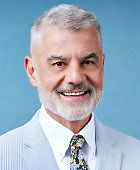Confronting Addiction From Prevention to Recovery: Join Me

The COVID-19 pandemic has caused—or more correctly accelerated—an awakening among the public to the fundamental importance of mental health and to what psychiatry can offer. Rather than suffer in silence, more and more people are publicly discussing their struggles with mental illness and substance use disorders in an open and honest way that would have been hard to imagine a few years ago.
What a great opportunity for psychiatry to make a difference, particularly for our youth; the LGBTQ+ communities; and minority/under-represented groups, who continue to be impacted by health care disparities and structural racism!
There is a chorus of voices calling out for help and an understanding of what you and I do every day. We need to respond to this call with leadership in mental health that provides adequate access to excellent care but also goes beyond the assessment, diagnosis, and treatment of psychiatric disorders. Scientists, journalists, politicians, athletes, and performers are asking us to explain, contextualize, and make recommendations for both psychiatric conditions and subdiagnostic psychological distress.
In other words, society has given psychiatry center stage. We have a voice, and we must take every opportunity to make ourselves heard. Empowering our members to use that voice, directly engaging the public, expanding our workforce, demonstrating our expertise, and seizing upon this extraordinary opportunity to capitalize on the world’s newfound awareness of the centrality of mental health in people’s well-being will be the essential tasks of my presidential year.
Focusing on a specific topic, I wanted to choose a theme that played to our strengths as a profession, my personal strengths as an addiction psychiatrist, and APA’s one-of-a-kind ability to effect meaningful change—from resolving scientific intricacies as reflected in DSM to testifying before Congress during some of the most consequential hearings of our times.
With this in mind, I have chosen “Confronting Addiction From Prevention to Recovery” as the theme of my presidential year. Public engagement and collaboration with other medical organizations, the government, and patient groups are the two pillars of the plan for my theme.
First, I have established a presidential work group, chaired by Dr. Smita Das, that will drive this effort. Dr. Das, along with Drs. Tauheed Zaman, Lief Fenno, Jeremy Kidd, and James Sherer, will develop, review, and promote content for quarterly public education campaigns centered around four topics: vaping, opioids, alcohol, and technology. The vaping campaign is already well under way due to the speedy mobilization of the Communications Team at APA. We will address opioids in the fall to align with the national recovery month in September; alcohol in the winter months, which include the vulnerable times of the holidays; and in the spring, the emerging technological addictions, such as internet gaming, cybersex, social media, texting and emailing, and online auctions and shopping.
Our second major effort turns to collaboration. Using Dr. Brendel’s Roadmap for the Future of Psychiatry as our guide, we are convening with allied groups to strategize on how to bring addiction prevention and treatment to the forefront of health care. In April, I met on Capitol Hill with the presidents of the Group of Six, our advocacy coalition that includes the professional organizations of family medicine, internal medicine, OB/GYN, osteopathic medicine, pediatrics, and psychiatry (see Group of Six Leaders Speak to Members of Congress on Workforce, Access to Health Care). Later this month, we will meet with a broader group, at APA headquarters, in preparation for a major town hall meeting later in the year. A primary aim of the meeting is to engage the permanent, administrative staff of these like-minded organizations to optimize our chances for sustainable gains. We don’t want to just move the needle on addiction; we want the needle to keep moving.
In addition to APA’s administration, who have already been an invaluable resource to me, I will be relying on you and your support as APA members to advance the objectives of my presidential year. I hope you’ll join me in telling the amazing story of psychiatry and spreading the message of mental health where you live and love and play and work, in any way you can.
We can show our country and the world who psychiatrists are and what we can do, and, if each of us does our part, we can achieve a better, more mentally healthy world. ■



